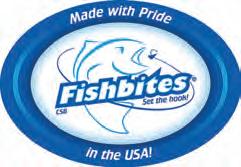


























Enjoy a more comfortable experience on the water with SeaStar Hydraulic Steering


Have full confidence when you take the helm, with knowledge that you have complete control of your vessel. SeaStar Pro by Dometic hydraulic steering systems, with options for most applications, ensure you will always have a safe and comfortable boating experience.
www.dometic.com



The hunt for the perfect outdoorsman knife is over. There’s only one tool you need: the Whitetail™ Hunting Knife—now ONLY $49!
The consummate outdoorsman never goes on deep woods hunting trips without the essentials. Not just the basics for every hunting trip, but the items he’s come to depend on over the years. Our new Whitetail™ Hunting Knife will quickly become your go-to blade for every expedition. The Whitetail™ is a premium fixed-blade hunting knife that’s perfect for skinning. With the Whitetail at hand, you’ll be ready for field dressing in only seconds, and you’ll never need a separate gut hook tool ever again. The Whitetail™ boasts a mighty 420 high carbon, full tang stainless steel blade, meaning the blade doesn’t stop at the handle, it runs the full length of the knife. According to Gear Patrol, a full tang blade is key, saying “A full tang lends structural strength to the knife, allowing for better leverage ...think one long steel beam versus two.” The comfortable handle is made from pakkawood—moisture-resistant and more durable than hardwood. If hunting is your life, then the Whitetail™ Knife was designed to make your life easier.
With our limited edition Whitetail™ Hunting Knife you’re getting the best in 21st-century construction with a classic look inspired by legendary American pioneers. What you won’t get is the trumped up price tag. We know a thing or two about the hunt–– like how to seek out and capture an outstanding, collector’s-quality knife that won’t cut into your bank account.
EXCLUSIVE FREE
Stauer® 8x21 Compact Binoculars

-a $99 valuewith purchase of Whitetail™ Hunting Knife




complete refund of the


What customers are saying about Stauer knives...


“Good value. Great looking. Sufficiently sharp. Overall an “A” purchase and I ordered three.”
This knife can be yours to use out in the field or to display as the art piece it truly is. But don’t wait. A knife of this caliber typically cost hundreds. Priced at an amazing $49, we can’t guarantee this knife will stick around for long. So call today! Your satisfaction is 100% guaranteed. Feel the knife in your hands, wear it on your hip, inspect the craftsmanship. If you don’t feel like we cut you a fair deal, send it back within 30 days for a complete refund of the item sale price. But we believe that once you wrap your fingers around the Whitetail’s handle, you’ll be ready to carve your own niche into the wild frontier.
Whitetail™ Hunting Knife $79*

Offer Code Price Only $49 + S&P Save $30

PLUS Free Stauer Compact Binoculars
— B. of Maryland TAKE 38% OFF INSTANTLY!







When you use your INSIDER OFFER CODE




or those of us afflicted with the fishing bug, nothing will deter us from returning to the ocean. We’re often planning our next trip before the current one is over. There is no difference between fishing daily, or being deprived for weeks, the fisherman’s mind will never stop nagging to get back out there.
Fishing stories and trophies are a great way to keep the inner fishing-monster soothed in between trips.
Photographs are an easy way to relive moments, and should not be overlooked. It doesn’t take much effort to get out a camera and capture the catch when it hits the deck while its colors are vibrant and the smile is fresh on the angler’s face. Friends don’t let friends take deadfish dock photos without at least a few taken out on the blue.
When it comes to fishing trophies, there is a whole lot more to be taken home than just some good photos.
The standard go-to trophies are wall mount replicas, which can easily be reproduced with some measurements and photos. This provides the opportunity to release the fish and also be able to take it home with you. Gray’s Taxidermy does excellent work with this type of customization, and outfits most charter companies with the

 By Capt. Quinlyn Haddon
By Capt. Quinlyn Haddon
required paperwork to get you started on this process. Make sure to ask your captain about mounting your catch before you release the fish.
There are still people who work with the tried and true art of fish taxidermy, utilizing the fish itself, but these services are harder to find, and the product doesn’t last forever.
Gyotaku fish rubbings are another way to accredit the true size of a trophy fish. The fish itself is painted and printed on paper. This method does not allow you to release the fish, but if you work quickly, and utilize acrylics, the fillets may still be consumed. This is a fun method to try on your own, but there are artists you can hire for this as well. These trophies work out better when wall space at home is more limited.
Various parts of the fish can be taken and treated, such as bills, tails, skeletal systems and even eyeballs transformed into epoxy shot glasses. These trophies can have some of the best outcomes, but require some involved and stinky DIY processing. There are a variety of techniques for this, and endless creative potential.
Participating in fishing traditions is another great way to boost the excitement of a first catch, and add to the memory. Who knows how these got started, but it is our communal obligation to keep them alive.
I’m sure there are some I have missed, but here
are the ones I know of, and practice.
When you catch your first tuna, it is customary to eat the heart or, at very least, take a bite out of it. It’s not bad with a bit of lime and a chaser. Tastes a bit like what I would imagine tuna-jerky to taste like.
When you catch your first marlin, you earn a celebratory jump in the ocean. Usually, this is done back at the dock for safety reasons. This is the most refreshing dip you’ll ever take.

When you catch your first swordfish, your crew will hollow out the eyeball, as to make a cup out of it, and you then take a drink from it. I highly recommend being quick about this before extra slime leeches out into your drink. Don’t worry, it all tastes like victory.
However deep your commitment to your fishing affliction may be, the best trophy will always be memories of having a good time. Most importantly, don’t forget to enjoy being out there. Your local captains understand that it’s difficult to manage life between fishing trips, and we are here for you. Blue Magic Charters is available for your next fix, out of Marathon, Florida Keys.
Capt. Quinlyn, of Blue Magic Charters, is also a Gyotaku artist and a Gray’s Taxidermy agent. Contact her at (504) 920-6342 and follow her social accounts @CaptainQuinlyn.

small green drake just as it was annihilated by a frisky brown trout.
I hurried to tie on a Colorado Green Drake and caught a brown on my first cast. My second cast was taken as soon as it hit the water—a nice rainbow. By then, drakes were all over the surface and the trout were feeding without hesitation. One trout went airborne, and I swear it was looking for the next green drake on its way back down.
It was dry-fly heaven fishing my 7.5-foot “Perfectionist” bamboo rod (made by “Preacher Jim” Beasley, of Crossville, Tenn.) and a green drake tied on 5X tippet. But over the ridge came ominous blue-tinged storm clouds. The pyrotechnics began immediately, with lightning pinging down all around me. Seeking safe haven, I dove into a shallow creek bed that emptied into the river. Elk, deer and bear tracks had beaten down the bed and formed foot-high banks. It was muddy but much safer. At first, it was too dangerous to even sit up, so I lay in the mud and watched the hatch, which was still in full swing.
In 25 years fly fishing, I’ve only experienced two bona fide green drake hatches. The second time I witnessed one of these hatches it was spectacular, the stuff of legends.

Green drakes are large mayflies that, under the right conditions, hatch in huge numbers and send trout into feeding frenzies. It happened for me one afternoon at about 8,750 feet of elevation on a Colorado river. The left bank hugged the base of a mountain ridge and the right bank opened onto a flat meadow of grasses and wildflowers. It was hot and windy—a tough day for fishing dry flies, but I’m a stubborn dry-fly bigot. I refused to nymph and hadn’t caught a single fish until the weather changed. Clouds floated over the ridge and the temperature and pressure dropped. A bright-white flash and instantaneous rumble sent me toward the truck, but on the way I spotted a
Eventually, the lightning lessened, and I was able fish. Once, two fish—a rainbow and a brown—came from opposite directions and arrived at my fly at the same time. A violent collision of noses ensued, and both fish quickly retreated. My drake was partially submerged after impact, but a different brown appeared, circled once, and daintily took the fly. He was not happy when I hooked him!
Once, I was surprised when my drake drifted almost back to me without a strike. Just as I was picking up the fly to cast again, an upstream brown came like a freight train. It took the fly on the uptake, went airborne and hit me in the chest. When you get nailed in the chest by a 16-inch brown, it’s gotta be a green drake hatch!

This short story (copyrighted by the author) and many other true-life fly fishing adventures can be found in Michael Fitzsimmons’ book “Adventures of a Dry-Fly Junkie,” available only on Amazon. Contact the author at dry_fly_junkie@hotmail.com.


Everyyear in Basel, Switzerland, the world’s best-known luxury watchmakers gather to display their new timepieces.
It’s a great event for spotting timepieces that standout–– in performance and in personality. We saw one impossible to ignore: a precision dive watch with an arresting green dial. But we also saw the five-figure price tag and knew we could bring our customers that exact same precision and stand out appeal for a whole lot less. The Stauer Evergreen Diver is that timepiece.
Built like a submersible battleship with a stainless steel case, caseback, and band, the Evergreen Diver is water-resistant down to 660 feet or 20 atmospheres, a feat facilitated by a hardened crystal and screw-down crown.
Green On Your Wrist AND In Your Pocket. You could pay an awful lot elsewhere for this verdant virtuoso, but the majority of the cost is in the big designer name upcharge. We think those guys are all wet. This is how you own a top-of-the-line dive watch without helping pay for some marketing guy’s yacht.
• Precision crystal movement


“Whether
Satisfaction Guaranteed or Your Money Back. Wear the Evergreen Diver for 30 days. If you’re not completely happy, send it back for a full refund of the item price.
Limited Reserve. A watch of this caliber, with a price that won’t drag you under, takes 6 months to create and won’t stick around for long. Call today!
Stauer Evergreen Diver Watch non-offer code price $399† Offer Code Price $99 + S&P Save $300

You must use the offer code to get our special price. 1-800-333-2045

Your Offer Code: GDW163-01

• Screw down crown
Rating of A+

Please use this code when you order to receive your discount.
• Stainless steel crown, case, caseback & band
• Magnified lens over date window at 3 o’clock
• Water resistant to 20 ATM
• Fits wrists up to 8 ½"


boat. It really is a very nice boat, notwithstanding the price point.”
The Mitzi Skiff 17’ is a stripped-down and customizable version of the 17’ Tournament, which comes with the options Grubbs said most of his fishing customers were asking for. Both boats draft just 7 inches loaded, they pole easily, they pole straight, and they reach speeds into the 40s with a 60 hp engine.

While the 15’ is a one or two-man boat that’s at-home on the flats, the 17’ can fish three people and it’s got better range. The 17’s primary purpose is still as a flats boat, yet it also doubles admirably as bay boat.

“It’s not just a flats boats; it’s a little bit of an open water boat, too,” Grubbs said.

The 17’ features a modified V-hull with an 11-degree deadrise at transom. There’s no hull slap, and rolled gunnels knock down spray for an exceptionally dry ride. They are built for light weight to run shallow, yet they are solid and durable to stand up to long years of heavy use.
Going back to the mid-1990s, Mitzi Skiff has led the industry with no-nonsense flats boats for skinny-water anglers.


In the very beginning, Tom Mitzlaff’s intent was to design the boat he needed to fly fish the flats. He couldn’t find an affordable boat on the market with the shallow draft, clean layout and quiet maneuverability he needed, so he designed and built the original 15-foot Mitzi Skiff.
That boat revolutionized the marketplace. Mitzi Skiff became the brand for skinny-water anglers who value simplicity and functionality. A Mitzi does everything the pricier skiffs do, yet they are affordable enough for any angler to own


and operate.
About 30 years later, Mitzi has expanded to offer 15’, 16’ and 17’ skiffs that all perform the purposes of the original design exceptionally well. Continued innovation has made Mitzi a boat other builders imitate, and they still come at a significantly lower price point than the competition. The 17’ and the 17’ Tournament have become the brand’s hottest sellers.
“The 15’ took the micro-skiff market by storm,” said Brad Grubbs, who owns and manufactures Mitzi Skiffs in North Carolina. “Since then, the brand has sort of evolved toward the 17’, which works just fine as a multi-purpose
From hideaway pushpole holders to flushmount hardware, Mitzi has obviously put some thought into making decks clean and fishable for fly anglers. Large, clean and stable casting decks are something Mitzi has become known for.
“Keep it simple stupid, and if it ain’t broke don’t fix it,” Grubbs quipped. For nearly three decades, Mitzi has built skiffs for anglers more interested in fishing than in spending a lot of money. It’s a philosophy that works.
Mitzi Skiff boats are available exclusively through select dealers. For more on Mitzi Skiffs, go to www.mitziskiffs.com.




YOU CAN ALSO VISIT OUR YOUTUBE CHANNEL, WHERE WE HAVE SEVERAL VIDEOS GOING IN DEOTH ABOUT THESE RIGS AND SETUPS

large size snapper and is one of the easiest and wellknown rigs to tie. For this rig I run 60-pound main line and place a 6-8 oz egg weight on the mainline. I then tie on a 120-pound power swivel to the main line and attach 60-pound leader (approximately 2-3 feet long) and attach a 6/0 circle hook on the end.

Opening day of Snapper season is upon us and with that the boat ramps will be packed with anglers headed out looking to fill the decks with Red Snapper, Vermillion, Grouper and much more. This month we are going to breakdown 3 rigs that can bring huge success this summer!

The chicken rig is an awesome rig for catching your smaller species fish such as vermilion and trigger fish to name a few. I also personally use a chicken rig to catch a lot of bigger live bait like grunts and porgies. For my chicken rig I use 50-pound main line to a 120-pound power swivel, from the swivel I use 50 pound leader and tie 2 dropper loops. I attach 1/0 circle hooks to the dropper loops and a 6oz tear drop weight to the end of the leader. The best bait to rig up on a chicken rig is squid or peeled dead shrimp.
The Carolina rig is my go-to rig for dropping down bigger dead baits like cigar minnows, Spanish sardines and pogies. This is an excellent rig for catching mid to

So, you want to catch big fish… well this is the rig!! The knocker rig is used for larger fish such as Grouper, AJ and huge snapper. This rig is typically used when large live bait is present. For this rig I use 80-pound main line to a 120 pound power swivel, then 80 pound leader to a 8oz egg weight. Lastly, tie a 8/0 circle hook to the end of the leader. This rig is designed to have the weight sitting directly on top of the live bait but does not allow the bait to swim around. The bait acting frantic but not able to get away is extremely enticing to larger reef fish.
I hope you found this information useful, and you get out and smash some big fish this summer. You can find much more information available on our YouTube channel “Southern Salt”. Until next time tight lines and stay safe!



Whatever your outdoor lifestyle experience, the Caddycan and Caddycan Jr. are a multi-purpose recreation and travel companion that offers a simple and convinient way to remove, conceal and secure waste.

Designed with a utility pocket, tough sturdy #10 zippers, swivel plastic D-ring clip w/ adjustable strap, and a rubberized opening at the top with automatic close. The heavy-duty, water-resistant interior compartment is easily removable, washable and reusable.
With its patented technology and design: they’re collapsible for easy storage and packaging. No tools required to mount and they FLOAT! They’re ideal for the Hunter, Boater, Angler, Golfer, and Camper. (Along with many other outdoor recreation enthusiasts.)



You can purchase one of our multiple size options avaliable on Amazon.



Junior, Standard and XL sizes Avaliable!
































June is hands-down my favorite month of the year to fish. The kiddos are all out of school and just about everything is in close. The temperatures and salinity are perfect for the Trout to get right off the beaches here in Bay Saint Louis and Pass Christian. There will also be plenty of fish on the nearshore reefs, the barrier islands, and of course, the Biloxi marsh. You definitely want to set an alarm, because the lines at the boat ramp and the bait shop will be long. Also, just plan on seeing plenty of boats all over the water. There are millions of places to fish, so please don’t get upset if someone is “in your spot”. The bait fish should be coming through literally everywhere. Diving birds, and slicks on the water will certainly give you a good indicator of where to start. I have always been a fan of trying to find the shallowest water with Bait, birds, and or slicks. That’s not to say you can’t catch trout in deeper water. I’ve just always seem to do better and shallower water(in the marsh and barrier islands).
The bull reds should be pushing through, So be prepared for some hard fights and frustration as they will bust up a school of feeding Trout faster than sharks or dolphins. They are a lot of fun though on light tackle. Speaking of sharks, those toothy, tough critters should be around the barrier islands all month. My favorite thing to do is find the schools of ladyfish, catch one and chop them


 Bay St. Loius, MS/ 228-342-2295
Bay St. Loius, MS/ 228-342-2295

www.shorethingcharters.com
up for Bait and drift through them. There is almost always sharks, Jack Crevalle, or bull reds underneath them.
The triple tail will hopefully make a big showing this month. We have been seeing a few here and there since April. We usually try to save our biggest live shrimp in the live well, just in case we spot a triple tail while moving through open water.
This is the month you definitely want to spend some time on the water with your friends and family. Just plan on there being crowds, and try to be patient with others. Respect other people space and don’t be afraid to explore.
































 BY SEAN VARONE
BY SEAN VARONE

Late spring is a great time for speckled trout fishing on the Gulf Coast. Speckled trout are popular gamefish that can be found in abundance in coastal waters from Texas to Florida.
Here are some tips and information to help you have a successful speckled trout fishing experience:
1 Location: Look for areas with a combination of grassy flats, oyster bars, marshes, and deep channels. Speckled trout are known to inhabit these areas, especially near structures such as docks, pilings, and reefs. Pay attention to tidal movements as trout tend to feed more actively during incoming tides.
2 Bait and Lures: Live bait such as shrimp, mullet, or small baitfish like croaker can be highly effective for targeting speckled trout. If using artificial lures, consider using soft plastic baits such as the Hoodwink by

Southern Salt Bait Company, topwater plugs, or suspending jerkbaits. Experiment with different colors and sizes to find what the trout are actively striking.
3 Tackle and Gear: Use a medium to medium-light spinning rod and reel setup with a sensitive tip to detect the subtle strikes of speckled trout. Spool your reel with a monofilament or braided line in the 8 to 12-pound test range. Carry a variety of hooks, weights, and leader materials to adapt to different fishing conditions.
4 Techniques: Speckled trout can be caught using various techniques. Try casting your bait or lure near grassy areas or around structure and retrieve it slowly, mimicking the movement of a wounded baitfish. If using live bait, use a popping cork to create noise and attract trout. You can also drift fish along channels or troll along flats to cover more water.
5 Time of Day: Speckled trout tend to be most active during early morning and late afternoon when the water temperature is cooler. However, they can also be caught throughout the day, especially during overcast or lowlight conditions.
6 Regulations: Make sure to familiarize yourself with the fishing regulations and size limits for speckled trout in your specific location. It’s important to practice responsible catch-and-release to preserve the population of these fish for future generations.
Remember to check weather conditions and tides before heading out, and always prioritize safety on the water. Enjoy your speckled trout fishing adventure on the Mississippi and Alabama Gulf Coast!
This recipe is super fast to prepare. The Blackstone cooks your fish, lemons, and asparagus. Grits can be made in advance and warmed before serving by adding a few tablespoons of stock to the pan while reheating
For the fish and asparagus:



• 2 speckled trout, cleaned and filleted. (4 filets)
• Fish Monger Fisherman’s Friend seasoning blend
• Zatarain’s Blackening Seasoning
• 4 lemons, halved

• Bundle of asparagus, washed and trimmed
• Stick of butter, sliced
1. Dr y fish thoroughly and season each side generously with Fish Monger and Zatarain’s Blackening seasoning blends.



2. On a medium-high griddle, add a swirl of vegetable oil. When the oil glistens, lay your filets on the hot griddle with an inch or so of space between them.

3. Add your undressed asparagus to the other side of the griddle, in a single layer.
4. Let fish cook 3 mins. While fish cooks, stir asparagus so it cooks evenly.
5. Cook fish 4 mins after flipping. Right before removing from griddle, add slices of butter on top of each filet.
6. Let butter melt over the fish before transferring filets to a serving dish to keep warm.
7. Asparagus should be close to ready when the fish is done. If not, use this time to lay lemons, cut side down, on griddle. Remove the lemons when they are dark brown and caramelized.

8. Move lemons and asparagus to serving platter to keep warm.
9. Season asparagus with salt, pepper, and olive oil.
We used Red Mill Corn Grits for this meal. Simple prepare as directed for cheesy grits. We use chicken stock instead of water and 1 cup of shredded Gouda instead of shredded cheddar. Your favorite cheese or whatever you have in the refrigerator will work great!
To put the meal together, we lay a hot buttered filet of trout over a serving of cheesy grits and arrange some asparagus on the side. Squeeze a hot, caramelized lemon half over your entire plate before serving!
• 26 Courses Available
• Women’s courses
• Youth courses
• History of firearms from Marco Polo’s introduction of black powder.

• Sheet and Trap range built to NSSA standards.
• Hogan’s Alley for tactical lessons.
• Reloading for the beginner.
• Evolution of our laws starting with Hammurabi to US Constitution and Alabama 13A.
• Concealed Carry Certified Instructor for Alabama, Florida and Mississippi.



• Every shooter on our range has completed a Safety and Etiquette Course.
• Map Reading and Orienteering course available.
• No club membership.
• Gun receipts and transfers.
• Ranges and classrooms can be rented.
• All covered outdoor ranges.
GunPort AcAdemy And rAnGe
A SPeciAlty School FirSt clASS ArmS trAininG, inc. 251.824.1776
www.firstclassarmstraining.org
Gary@firstclassarmstraining.org
c redentials
--- William Gary Mozingo --- Lt. C. US Army Rt. 23 YRS. ---

---- Firearms Instructor 28 YRS --- NRA/LEA #32978330 ---
--- Select-Fire, Precision Rifle, Patrol Rifle, Handgun/Shotgun ---





























Summertime is knocking on our door and that leaves us with a couple of decisions. We can follow the bass out of the shallows and into the main lake or rivers or target the Bream Eaters. There is a population of bass that always stay shallow. Some people call them resident bass. I call them Bream Eaters. Bream will spawn throughout the summer giving those shallow bass a steady diet of one of their favorite meals. The first place I’m going to look for these fish is all the way in the back of pockets or creeks. If there is a running stream or spring of any kind back there that is a bonus as it will bring cooler and more oxygenated water to the bass. These fish can be caught several ways this time if the year. Early mornings can be great throwing top waters. Either a buzzbait or whopper plopper to cover water or a popper if the fish want you to slow down your presentation. Once the sun comes up your best bet is to skip frogs or senko type baits under over hanging limbs where these bass hide from the sun. I’m going to throw natural color in the frog and either a black and blue or green pumpkin on the senko. And last but not least and this is definitely an over looked bait is the trusty spinnerbait. Pick a color that most resembles the bream in the area and slow roll it next to any cover that might be holding a waiting bass. So next time you’re on the water spend a little time in the shallows and see if you can get on a Bream Eater bite









Today we’re going to take a look at the newest Shimano Stradic C3000 FL. They knocked this one out the park! Lightweight and smooth doesn’t even describe this reel. This reel is one of their most “sealed” mid range reels I’ve seen as well. O-Rings and Gaskets all over to help keep water out. Upgraded anti reverse system and upgraded carbon drags (20lbs) really help this reel out with strength and smoothness. Trout, Flounder, and Redfish don’t stand a chance! The reel retails at $219.99 and more than worth the price. Go check one out at your local tackle shop.






If you were not aware, Shimano has released the New Tekota 800PG! They stepped up the drag rating from the old 24lbs up to 35lbs with the help of Cross Carbon Drag Washers. It’s going to be a winch on some big Snapper with the 3.9.1 Gear Ratio. Also has the Core Protect System to help the internals of the reel. Retail is coming in at $299.99. Go check one out at your local tackle store. I know we can’t wait to put ours to work this coming up season!










For anglers looking to conquer the toughest offshore conditions, Okuma’s Cavalla 2-Speed Lever Drag reels are the ultimate weapon of choice. Over the past decade, Okuma has cemented its position as a leader in the saltwater market, starting with the groundbreaking Makaira line of reels. Today, the Cavalla 2-Speed Lever Drag is yet another example of Okuma’s unwavering commitment to providing top-tier, reliable products for saltwater anglers.
With its compact, machined aluminum frame and side plates, the Cavalla is a reel that can withstand the toughest conditions Mother Nature can throw at it. The rigid one-piece frame ensures stability and durability, while the cold-forged, type-II anodized machined aluminum spool adds to the reel’s sleek, rugged design. Whether you’re targeting monster grouper, sailfish, giant snapper or other offshore saltwater species, the Cavalla is the reel you want in your offshore arsenal.
The Cavalla reels feature a battle-proven carbonite drag system with Cal’s drag grease that can put out an impressive 24 to 34 pounds of drag at full. The 17.4 grade stainless steel main and pinion gear, along with the CRC coating process, make this reel virtually corrosion resistant. With four corrosion-resistant stainless-steel bearings and a silent retrieve system, the Cavalla operates
smoothly and efficiently, ensuring that you never miss a catch.
Okuma’s Cavalla
2-speed reels feature a 6.4:1 and 3.8:1 gear ratio on the 5 size reels and a 4.7:1 and 2.1:1 gear ratio on the 12 size, allowing for versatile performance across a range of fishing styles. The 5 and 12 size reels come in both left- and right-hand retrieve and feature an on/off bait clicker. The reel’s compact size and comfortable Ergo Grip handle knob and anodized aluminum handle arm make it easy to handle and use for extended periods of time.
So, why should you choose the Cavalla lever drag reel for your next offshore fishing trip? Here are five reasons:

• Durable Construction: The Cavalla’s machined aluminum frame and side plates, along with its corrosion-resistant components, ensure that this reel can handle the toughest offshore conditions with ease.
• Versatile Performance: With its 2-speed capabilities and variable gear ratios, the Cavalla is a reel that can adapt to a range of fishing styles and conditions.
• Smooth Operation: Thanks to its silent

the Cavalla operates smoothly and efficiently, ensuring that you never miss a catch.
• Strong Drag System: The Cavalla’s carbonite drag system with Cal’s drag grease can put out up to 34 pounds of drag, making it a reel that can handle the biggest and toughest fish in the ocean.
• Comfortable Handling: With its compact size and Ergo Grip handle knob and anodized aluminum handle arm, the Cavalla is a reel that you can use comfortably for extended periods of time, even during the toughest offshore fishing trips.
The Okuma Cavalla 2-Speed Lever Drag reel is an all-around, top-of-the-line reel that every saltwater angler should have in their arsenal.
For distributors and retailers, Okuma Fishing Tackle Corporation will be available to meet at ICAST 2023 in Orlando, Fla. July 11-13 at Exhibit Hall Booths 1202 and 1308.

It’s Kingfish Time! The 43rd annual 121 Financial Credit Union Greater Jacksonville Kingfish Tournament is slated for July 17-22, 2023. For five days, with four tournaments and $400,000 in prizes, the “Grandaddy of all Kingfish Tournaments” will keep the docks buzzing with fun events for everyone from die-hard anglers to casual spectators.

The cornerstone of this historic and thriving event is the general tournament, which launches Friday, July 21 with a boat package valued at $160,000 going to the team that lands the largest kingfish. The grand prize is a sweet 25-T Contender with twin 150hp Yamahas, a custom T-top by Custom Marine and an Ameritrail trailer. The tournament pays through 20 places for largest fish and aggregate, as well as a Lady Angler division that pays to 10 places, totaling nearly $250,000 in cash and prizes.

All the boats and the fish coming into the docks at Jim King Park and Boat Ramp at Sisters Creek Park in Jacksonville creates a festival atmosphere. Traditionally, the tournament draws thousands of spectators who enjoy cold beverages, hot food and vendors at the Liar’s Tent. Awards Day on Saturday, July 22 is all about celebration, with Kids Zone activities, drawings and a fishing seminar, followed by eye-popping fireworks in partnership with the City of Jacksonville.
Also for the kids, there is a Junior Angler Offshore Tournament on Wednesday, July 19, as well as a Junior Angler Dock Tournament. The grand prize in the Junior Angler Offshore Tournament is an Ohana 14’ skiff with a 25hp Yamaha and trailer, and this tournament pays through 25 places.
popular Redfish Tournament fishes on Saturday, July 22, with weigh-ins at 2 p.m. during the Awards Day activities.

Through its history, the Greater Jacksonville Kingfish Tournament has been all about putting on a great tournament and helping to provide access to marine resources and promoting education, preservation and research in partnership with its junior anglers and Jacksonville University’s Marine Biology Department. Jacksonville Marine Charities is the operating arm of the event, and it supports non-profits throughout the state. Recently, Child Cancer Fund, the Down Syndrome Association and the Child Guidance Center have benefitted from the organization, which also supports other local charity fishing events like The Premier Trout, Flounder Pounder, Wounded Heroes on the Water and others.
For complete details, go to https://kingfishtournament.com/.
Coastal Angler and The Angler Magazine, Suzuki Marine and Sea Eagle have come together to offer readers a shot at this Sea Eagle FishSkiff 16 paired with a Suzuki DF4 outboard that’ll take you wherever the fish are. The FishSkiff 16 is an inflatable fishing boat that is lightweight, sturdy, stable and extremely packable. It rolls up small enough to fit in the trunk of a car and quickly inflates into a fishing machine. Powered by Suzuki’s four-stroke DF4A, you’ll have to hold on to your hat as you scream over the flats. Designed for efficiency and performance and portability, the DF4A provides all the speed and acceleration you can handle. It’s lightweight and can be attached or removed with ease.


Breakdowns are unpredictable, make them less stressful with an Unlimited Towing Membership from TowBoatU.S. You can relax, we’ve got your back.

This is the time of year when bass gorge themselves on bluegill. One of the best ways to catch bluegilleaters is with a swim jig.
The swim jig is a versatile bait. It can be used in different colors and actions that drive bass crazy. All the variety can make jig shopping a bit overwhelming. There are thousands of color options, countless styles, different hooks and line-tie variations. When I’m looking for the perfect swim jig, I keep a few things in mind. I only throw two different color combinations, bluegill duplicators— the greens, browns and oranges—and a black and blue. You want a jig with a slender head style with a vertical line tie that will come through the cover you’re fishing. I also like a jig with a stout hook. Throwing a swim jig around heavy cover calls for heavy line, and you don’t want your hook to bend out or break when you hook into a big one.
Selection of jig trailers can also be overwhelming. Guess what? I only throw two different styles of trailers. I usually put a swimbait-style trailer with a boot tail on the back, but occasionally I’ll use a craw trailer with two kicker legs. At the end of the day, you just want something back there kicking
and giving your jig some action, and these two styles are my go-to. I match the color of the trailers to the color of the jig.
The cover to target with a swim jig can be endless. They are great in vegetation as well as around docks, wood, rocky banks and for covering water over expansive flats with wood and grass. You can cover a lot of water with this bait, and typically covering more water leads to more bites. You should throw it anywhere bass are chasing bluegills or where bass are actively feeding. I always keep one tied on and ready.
A retrieve I find myself using a lot is a yo-yo retrieve. Point the rod tip high and vary the retrieval speed by either cranking fast and slow or moving the rod tip. This gives the bait some erratic movements and drives them crazy. I also use a steady retrieve. Depending on the part of the water column you are trying to target, you can reel the bait fast and keep it up high—even on the surface—or slow it down and creep it deeper, maybe to keep it around some submerged cover.
Fishing cover requires heavier equipment. I fish a heavy action rod with a length between a 7’3” and 7’6”. The 13 Fishing Defy Black 7’5H is a super affordable rod and is awesome for the job. Pair the rod up with a fast reel like the 13 Fishing Concept A 7:5 spooled up with 50-pound Seaguar Smackdown braid, and you are ready to put some fish in the boat.

Tyler Woolcott is a professional tournament angler and guide. Check out his website at www.tylerwoolcottfishing.com.
















































The super sleek, super stable inflatable FishSkiff™ 16 now features a patented drop-stitch outside keel for precise steering and better open sea motoring performance! Due to the new ultra-light, ultra-strong fusion technology that bonds two layers of reinforced PVC together the FishSkiff™ is super tough and super stable. Great for 1, 2 or 3 anglers.


Whether you use a gas or electric motor, the in atable FishSki ™16 will get you to the sh. Add a canopy for protection from the sun or rain. Add a solar panel for perpetual power that can keep your electric motor battery charged; whether your camping, live on the water or just love the idea of solar power.
With the NEW drop-stitch keel, you’ll have less course correction and improved performance. The low gunwales give you superb access to the water for landing sh, releasing sh, and getting on & o the boat.




















In early May, a 600-plus-pound bluefin tuna was brought to the docks at Alabama’s Orange Beach Marina. It was not a world or state record, but it was a giant fish and a first for Capt. Johnny Greene who has been a charter captain for the last 33 years.

According to the story written by David Rainer for the Alabama Department of Conservation and Natural Resources (ADCNR), Greene and his crew aboard the Intimidator were hosting a group of anglers from Georgia on a three-day trip deep into the Gulf of Mexico. Greene said he has encountered big bluefins before in the April and May timeframe, when they arrive in the Gulf to spawn, but he’s never managed to put one in the boat or even “slow one down.”



“Last year we hooked one about noon and fought that fish four or five hours. We had 10 people on that charter, and they ended up changing the rod between anglers probably 20 or 25 times,” he told ADCNR. “We ended up breaking a rod after fighting him that long. We were so close, so that one was really a heartbreaker.”
This recent trip did not end in heartbreak. After hooking the fish, the Intimidator chased it for about 2 miles before getting to within 100
feet of the leader. Then the fish dove deep. They managed to stop the dive with a Shimano 50-wide and a stand-up harness, and after battling it for about four hours they could tell the fish had died. They began the laborious process of winching it up on 80-pound-test mono.



“When you have to pull a 600-pound animal up, it’s not the easiest thing to do,” he told ADCNR. “It requires communication between the angler, everybody in the cockpit and the wheelhouse. It’s basically a momentum game. You’ve got to get the fish coming up, and you have to keep him coming. If you take a break, the fish is going to start sinking again. It’s tricky.”


The celebration began when they finally brought the giant fish to the surface and tethered it with a tail rope. They used a come-along to hoist it into the boat.


Knowing their fish was not a record, the crew went ahead and gutted it and iced it down to preserve the meat during the ride home. It weighed 579 pounds gutted, with an estimated total weight of 625 pounds. The Alabama state record, caught in 2006, weighed 829 pounds.
To read David Rainer’s entire account of the catch, go to www.outdooralabama.com.





believe the popping cork found its beginnings in the 1930s, and it’s still a mainstay in most saltwater anglers’ tackle boxes. Many versions have been introduced along the way and undoubtedly more will come. One thing is for certain, if they didn’t work, they would not have lasted for nearly a century. In Texas, a popping cork typically finds itself dragging a live shrimp, but there are other options. What makes the popping cork stand out is the cupped top, which creates a popping sound and splashes water forward when twitched. It simulates a fish feeding on the surface.


I was once no different than the masses tossing live shrimp under a cork, but in the early 2000s— when I had already turned my focus to exclusively lure fishing—I found another place for the simple but effective popping cork.
At that time, our famous Baffin Bay was plagued with brown tide, an algae bloom that turns the water, well, brown. The water had nearly zero visibility, which made fishing soft plastics difficult at best. Looking back, I wish I had already invented my Knockin Tail Lures with the built in tail rattle, but better late than never. At the time, I started using lures under a cork instead of live shrimp. I realized a noticeable increase in the number of fish I was able to catch. Depending on the circumstances, I would use a jighead, a weighted weedless hook or an unweighted hook about 24 inches under my cork. Although I heard
a lot of grief from my buddies who would not touch a popping cork, it worked and I continued to out fish them on most trips. I stayed with this technique in Baffin until the brown tide cleared.
A lure under a cork is also a great way to introduce kids to lure fishing. Paddletails, twitch baits and artificial shrimp all work well with this strategy. The method takes a lot of the hand coordination out of the picture for children and lets them realize that you don’t need live bait to catch fish.

Another of the many options this cork gives the angler is a way to effectively fish jetties. At times, trout will suspend 8 to 10 feet deep off the rocks. In this situation, the popping cork’s sound creating ability is still important, but it needs to be modified. Casting a cork with 10 feet of leader to get your lure down to the fish creates a challenge. This is where the slip cork method comes into play. With a slip cork, you can cast a 2- or 3-foot leader or less, but the cork will have a rubber stop that allows your bait to sink to the desired depth where the bite is. Look up slip cork for more on this method.
The weather is warm, don’t forget to take a kid fishing!
To some, sunglasses are a fashion accessory…
Drivers’ Alert: Driving can expose you to more dangerous glare than any sunny day at the beach can… do you know how to protect yourself?
Thesun rises and sets at peak travel periods, during the early morning and afternoon rush hours and many drivers find themselves temporarily blinded while driving directly into the glare of the sun. Deadly accidents are regularly caused by such blinding glare with danger arising from reflected light off another vehicle, the pavement, or even from waxed and oily windshields that can make matters worse. Early morning dew can exacerbate this situation. Yet, motorists struggle on despite being blinded by the sun’s glare that can cause countless accidents every year. Not all sunglasses are created equal. Protecting your eyes is serious business. With all the fancy fashion frames out there it can be easy to overlook what really matters––the lenses. So we did our research and looked to the very best in optic innovation and technology. Sometimes it does take a rocket scientist. A NASA rocket scientist. Some ordinary sunglasses can obscure your vision by exposing your eyes to harmful UV rays, blue light, and reflective glare. They can also darken useful vision-enhancing light. But now, independent research conducted by scientists from NASA’s Jet Propulsion Laboratory has brought forth ground-breaking technology to help protect human eyesight from the harmful effects of solar radiation
Eagle Eyes®
Lens
more vivid and sharp. You’ll immediately notice that your eyes are more comfortable and relaxed and you’ll feel no need to squint. The scientifically designed sunglasses are not just fashion accessories—they are necessary to protect your eyes from those harmful rays produced by the sun during peak driving times.
light. This superior lens technology was first discovered when NASA scientists looked to nature for a means to superior eye protection— specifically, by studying the eyes of eagles, known for their extreme visual acuity. This discovery resulted in what is now known as Eagle Eyes
The Only Sunglass Technology Certified by the Space Foundation for UV and Blue-Light Eye Protection. features the most advanced eye protection technology ever created. The TriLenium Lens Technology offers triple-filter polarization to block 99.9% UVA and UVB— plus the added benefit of blue-light eye protection. Eagle Eyes® is the only optic technology that has earned official recognition from the Space Certification Program for this remarkable technology. Now, that’s proven science-based protection.
The finest optics: And buy one, get one FREE! Eagle Eyes® has the highest customer satisfaction of any item in our 20 year history. We are so excited for you to try the Eagle Eyes® breakthrough technology that we will give you a second pair of Eagle Eyes® Navigator™ Sunglasses FREE––a $59.95 value!
That’s two pairs to protect your eyes with the best technology available for less than the price of one pair of traditional sunglasses. You get a pair of Navigators with stainless steel black frames and the other with stainless steel gold, plus one hard zipper case and one micro-fiber drawstring cleaning pouch are included. Keep one pair in your pocket and one in your car. Your satisfaction is 100% guaranteed.
If you are not astounded with the Eagle Eyes® technology, enjoying clearer, sharper and more glare-free vision, simply return one pair within 30 days for a full refund of the purchase price. The other pair is yours to keep. No one else has such confidence in their optic technology.Don’t leave your eyes in the hands of fashion designers, entrust them to the best scientific minds on earth. Wear your Eagle Eyes® Navigators
Studies by the National Highway Traffic Safety Administration (NHTSA) show that most (74%) of the crashes occurred on clear, sunny days


Navigator™ Black Stainless Steel Sunglasses
Receive the Navigator™ Gold Sunglasses (a $59.95 value) FREE!



just for trying the Navigator™ Black
Navigator™ Gold Stainless Steel Sunglasses
Certified EAGLE EYES® was developed from original NASA Optic technology and was recently inducted into the Space Foundation Technology Hall of Fame.

Fit-ons available for $39 +S&H
Black or Tortoise-Shell design
with absolute confidence, knowing your eyes are protected with technology that was born in space for the human race.
Two Pairs of Eagle Eyes® Navigator™
Sunglasses $119.90†
Offer Code Price $49 + S&P Save $70.90
Offer includes one pair each Navigator™
Black and Navigator™ Gold Sunglasses
1-800-333-2045
Your Insider Offer Code: EEN957-06
You must use this insider offer code to get our special price.
14101 Southcross Drive W., Ste 155, Dept. EEN957-06 Burnsville, Minnesota 55337 www.stauer.com
the offer code versus the price on Stauer.com without your offer code.
If this potbellied 73.29-pound lake trout isn’t a new world record, it should be.

Scott Enloe and his son Hunter were fishing an undisclosed Colorado lake in early May when Scott hooked into the 47-inch-long monster on a 6-inch tube jig and 10-pound test. According to Free Range American, it took 13 tense minutes to fight the huge laker boat-side, and both men had to haul it over the side because their net was too small to land the fish.
The fish was full of eggs and had an incredible girth of 37 inches. After some photos and measurements, they released it to go lay those eggs and spread the genetics for obesity.

The IGFA all-tackle world record for lake trout weighed 72 pounds, even. It was caught in 1995 by Lloyd Bull at Great Bear Lake in Canada. With the strict procedures required by IGFA for record consideration, it is unlikely Enloe’s fish will break the all-tackle world record, but there is a chance the organization will consider it for a world length record.
The current Colorado state record weighed 50.35 pounds. It was caught by Donald Walker in 2007. We’re not sure about Colorado’s record submission requirements, but most states require a weight taken on certified scales.
Regardless, it is the fish of a lifetime for Enloe, and if it doesn’t qualify for a record… it should.
To read the full report from Free Range American, go to https:// freerangeamerican.us/world-record-lake-trout-enloe/
There’s no doubt these guys can get it out past the breakers. The Carolina Surf Casters Association gets together four times a year to hold distance-casting competitions. In an April contest, North Carolina’s Ryan Lambert set a record for the longest fishing cast in U.S. history. He launched a massive 889-foot, 4-inch cast.
Lambert is a frequent competitor in the sport of surf casting, known in Europe as long distance casting of sea weights, in which participants gather on a large marked field with surf fishing tackle to see who can cast different sizes of large sinkers (3.5 to 8 ounces) the farthest.
Though the sport originated in the U.S., reportedly as far back as the 1890s, it has become more popular in Europe and South America in recent decades. Only three surf casting clubs exist in the U.S. today. They are SurfCast USA (SCUSA), based in Maryland, Surf Fishing & Casting Club International (SFCCI), on Texas’ Gulf Coast, and Carolina Surf Casters Association (CSCA), in eastern North Carolina.
Lambert is the vice president/secretary of the CSCA – a more than 10-year-old organization with members from North Carolina, South Carolina, Delaware, Virginia, Maryland and Texas. The club organizes four competitions per year in spring and fall. These events are open to surf casters of all skill levels.
Lambert, a sales representative for a large agricultural supplier, lives in Angier, N.C., with his wife Blair and their two daughters. He’s an experienced saltwater fisherman who, like most competitive casters, originally developed long-distance casting skills to improve catch rate from piers and the beach. He learned those skills under the tutelage of fellow North Carolinian and long-time U.S. surf casting champion Tommy Farmer.
Tapping into his athleticism from playing baseball for N.C. State University, Lambert is able to generate huge power using a pendulum cast. This highly specialized technique involves swinging the sinker into an orbit around the tip of a long 12- to 14-foot surf rod, and at a precise moment, rotating the body and rod through a large arc, ending with a powerful punch-pull motion with the right and left arms.
“It’s great that one of our own from North Carolina—someone from our club, no less—was able to set this new benchmark,” said Matt Tuers, president of the CSCA. “One of the main objectives of this organization is to grow a community where U.S. casters can develop and start taking back the international records. Casters like Ryan are in a position to do that, as well as inspire the next batch of elite American competitors.”
The current world record longest cast is held by “Big Danny” Moeskops of Belgium with a 940 foot cast made in the early 2000s. The previous U.S. record was held by Will Nash of Texas, with 873 feet.
Check out CSCA at carolinasurfcasters.org.



Watauga River
Home of world class fishing on the beautiful Watauga Lake, rugged Doe River and designated trophy trout stream, Watauga River PLAN


Watauga Lake
Doe River

